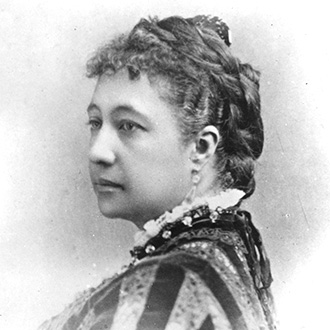


Princess Pauahi, born on December 19, 1831, was the only child of chief Abner Pākī and chiefess Laura Konia. The latter was the daughter of Pauli Ka‘ōleiokū, son of Kamehameha I. The great Kamehameha traced his lineage through the Keōua and Keawe lines of illustrious rulers of the island of Hawai‘i. They, in turn, according to tradition, went back to Papa, the Mother Earth and to Wākea, the Sky Father.
Pauahi's royal origin gave her rank and power. From childhood, she was taught the values and the duties of a chiefess. She learned to give as well as to receive, and that humility is the ali‘i's defense against excessive pride and egotism. Pauahi's practice of giving to friends and to those in need culminated in her final gift of her estates to found and maintain Kamehameha Schools.
At the age of seven, Pauahi was enrolled in the newly organized Chiefs' Children's School. The young missionaries chosen to operate the school were Juliette and Amos Cooke. Pauahi's classmates included the future kings: Alexander Liholiho, Lot Kapuāiwa, William Lunalilo, and David Kalākaua. Those who became queens were Emma and Lili‘uokalani. The pupils were schooled in English and in the ways of the westerners who were settling in Hawai‘i in increasing numbers.
The Cookes wrote of Pauahi as being their "brightest" pupil. She became skilled in oral and written English which was, of course, a second language for all the pupils. Pauahi painted attractive pictures. She played the piano well enough to teach the younger pupils and to play for the guests who came to see this interesting school. She loved to ride horseback and to play "hard" as her teachers described the vigorous outdoor play.
Charles Reed Bishop, a young man from New York, came with increasing frequency to call on Miss Bernice. They were married in the school parlor when Pauahi was nineteen. Although childless, the Bishops were a happy and devoted couple and leaders in the social life of the city.
Mr. Bishop prospered through his bank and wise investments. Pauahi inherited her parents’ large, handsome house where they entertained local friends of all ethnic groups and officers from visiting ships.
One of the unforgettable images we have is of Pauahi seated under her tamarind tree, listening to the maka‘āinana (citizenry) who had come to seek her help. This was her court, under the shade of the tree which her father had planted on the day of her birth. These contacts were an effective way for her to keep informed about the events and problems in her realm and to stay in touch with her people. One could not guess the number of people Pauahi helped as she talked with them over a period of thirty years.
In 1883, Pauahi's doctors diagnosed her illness as cancer. In consultation with her husband and close business associates, she established the Bernice Pauahi Bishop Trust which instructed her trustees to use the income from her extensive lands to found and maintain schools for boys and girls. Her last days were spent in Keōua Hale with her devoted husband at her bedside. The end came on October 16, 1884.
Kulu ka waimaka, uē‘ōpua. "The tears fall, the clouds weep." So it was said in earlier days when rain fell at the time of a person's death. The gods mingle their tears of affection with those who weep in sympathy and aloha.
While the gods wept, so did Pauahi's friends in Hawai‘i. Not since the passing of little Prince Albert more than twenty years earlier had Hawaiians displayed such genuine grief.
The Reverend Cruzon spoke of Pauahi as the "last and best of the Kamehamehas" at the church service on the Sunday following her death.
"The great loss which Hawai‘i sustained was not that the last of this great line of High Chiefs died, nor that the possessor of great wealth died, but that a true woman died. That Bernice Pauahi Bishop was such a true woman her life bears witness. Refusing a crown, she so lived that she was crowned. Refusing to rule her people, she did what was better, she served them."
For your enjoyment, listen to some favorite Kamehameha Founder’s Day mele